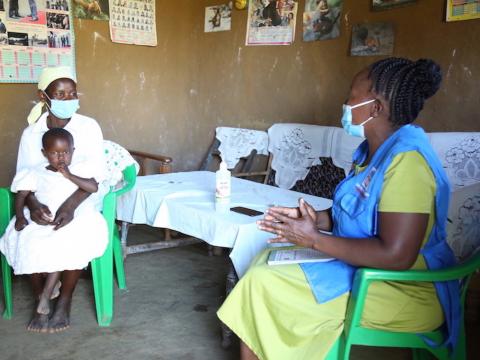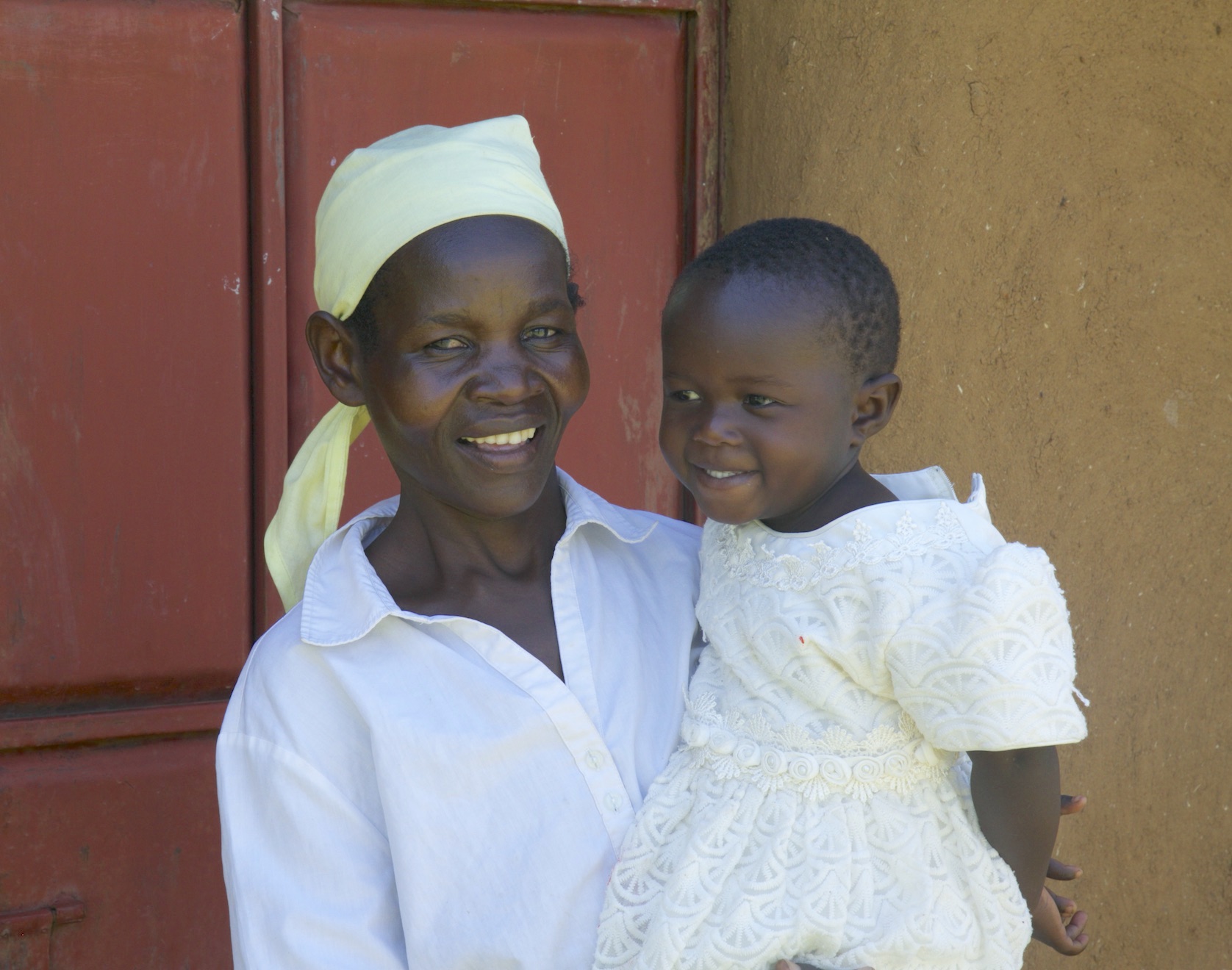Empowering communities to eliminate malaria

By Irene Sinoya, World Vision Communications Specialist, Kenya
When we arrived at Nangila’s rural home in Kenya’s Kakamega County, we found her playing with her two-year-old baby,Blessing.
She refers to Blessing as a miracle baby, since the child was born after she underwent a painful experience.

“I lost two children under circumstances I considered mysterious. Their death filled me with so much despair and grief. I was sad for a long time, before Blessing came to our life,” recalls Nangila, aged 39.
The children had been sick for some time, with high body temperatures, followed by chills before succumbing to the illness.
During that period, Nangila belonged to a religious sect that discouraged hospital visits among its members.
“The sect did not believe in sickness. Therefore, when the two children fell sick, I thought it was as a result of witchcraft. So, I took them to church for prayers. But their health continued to deteriorate. And that is how I ended up losing them. One was three years old while the other one was aged six,” she says.
“It was so heart-breaking to watch the two children die in my hands. Surprisingly, I remember the two babies had exhibited similar symptoms before they died. They would become so hot, and then start shivering followed by fast breathing. They all died as I held their cold hands,” adds Nangila, on the brink of tears.
The death of her two children remained a mystery, until the day she was enlightened on malaria control initiatives by Rose, a Community Health Volunteer (CHV) who had been empowered by World Vision, through the support of The Global Fund and Amref Kenya.
The CHV noted that Nangila had been devoting too much of her time to the cult activities, thereby neglecting her children and household chores.
As such, her home compound was bushy with plastic containers everywhere. In addition, Nangila’s family did not observe good hygiene practices. Consequently, their house was filled with unnecessary items, which provided an ideal breeding ground for mosquitoes that spread malaria.
At the time of her first encounter with the CHV, Nangila was expecting her fifth child, Blessing. Despite being three months pregnant, she had never visited a health facility for prompt malaria testing as well as other pregnancy check-ups.
After the CHV enlightened Nangila on the causes of malaria and ways to prevent the disease, it downed on her that their two children had succumbed to malaria and not witchcraft as they had previously assumed.
Immediately, Nangila made up her mind to put into practice the malaria prevention measures she had learnt about.
She began by draining stagnant water around the compound, as well as clearing bushes to eliminate environmental breeding grounds for mosquitoes. She also disposed of numerous plastic containers with stagnant water that littered the compound.
“Initially we had been brainwashed by the cult. My husband and me never used to interact with other people. This made it hard for us to know such important matters, ” she says.
Rose noted that Nangila had been devoting too much of her time to the sect activities, thereby neglecting her children and household chores.
As such, her home compound was bushy and littered with plastic containers everywhere. In addition, Nangila’s family did not observe good hygiene practices. Consequently, their house was filled with unnecessary items, which provided an ideal breeding ground for mosquitoes that spread malaria.
At the time of her first encounter with Rose, Nangila was expecting her fifth child, Blessing. Despite being three months pregnant, she had never visited a health facility for prompt malaria testing as well as other pregnancy check-ups.
After Rose enlightened Nangila on the causes of malaria and ways to prevent the disease, it dawned on her that their two children had succumbed to malaria and not witchcraft as they had previously assumed.
Immediately, Nangila made up her mind to put into practice the malaria prevention measures she had learnt about.
Together with her husband, she began by draining stagnant water around the compound, as well as clearing bushes to eliminate environmental breeding grounds for mosquitoes. She also disposed of numerous plastic containers with stagnant water that littered the compound.
“Initially we had been brainwashed by the sect. My husband and me never used to interact with other people. This made it hard for us to know such important matters, ” she says.
The couple also removed clutter from their house, making it more spacious, hence eradicating hiding places for infectious mosquitoes.
Following the enlightenment by Rose, Nangila was convinced, for the first time in her life, to visit a health facility during pregnancy.
The doctor conducted a Rapid Diagnostic Test (RDT), which turned positive after malaria parasites were detected in her blood.
“I was surprised to learn that I had been suffering from malaria without my knowledge. Fortunately, the doctor gave me the appropriate medication and I recovered,” she says.
With the support from World Vision, Nangila was also given insecticide treated bed nets that are issued routinely to expectant women and mothers with children below five years. Compared to normal nets, the insecticide treated ones are able to not only prevent mosquitoes but also to kill them.
Pregnant women and young children are often prioritised as they are at a considerably higher risk of contracting malaria, and developing severe disease than other people.
Malaria makes expectant mothers to be highly susceptible to anaemia. Women with the condition lack sufficient healthy red blood cells to carry oxygen throughout the body. This can lead to the failure of vital body organs and death. It also increases the risk of spontaneous abortions, stillbirths, premature deliveries and having babies with low birth weight that increases their chances of dying.
As a result of adhering to the malaria control measures, Nangila delivered her baby, Blessing, safely without any complications.
She followed her doctor’s advice and consistently took her baby to hospital to get all doses of the new malaria vaccine within the scheduled timelines.
In addition, Nangila ensured that Blessing slept under a bed net each night, even as she continued following the other malaria prevention measures.
“I can see the difference. At two years, Blessing is healthy and more active and bubbly compared to other children that were not vaccinated. She even started speaking at 9 months unlike the other children that faced speech delays.
Based on her personal experience, Nangila now advises other women in her community to avoid being misled by religious leaders that give erroneous health advice.
“I tell them that they should go to hospital and take their children there too, whenever they are sick. When people are ill, they should not rely on prayers alone. They should go to hospital too, since God uses doctors to heal us,” she says.
Nangila has since abandoned the religious sect for another church that offers her family spiritual nourishment while at the same time giving congregants factual health messages.
Jacqueline Musichi, a Malaria Project Officer for World Vision in Western Kenya notes that the CHVs have contributed significantly to the reduction of malaria cases in the region.
“They have helped communities to adopt good health practices and do away with traditional beliefs and religious practices that endanger their lives.”